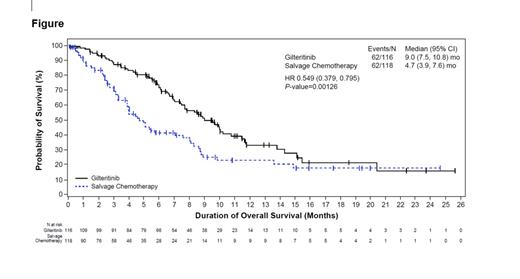Abstract

Background: Due to poor prognosis, treatment options for patients with FLT3-mutated (FLT3mut+) acute myeloid leukemia (AML) who are refractory to therapy or have relapsed (R/R) are needed globally. Gilteritinib is approved in multiple countries, including Japan, and has recently received conditional approval in China for the treatment of R/R FLT3mut+ AML; in the phase 3 ADMIRAL trial, superior survival benefit and a favorable safety profile were shown for patients receiving gilteritinib compared to those receiving salvage chemotherapy (SC) (HR 0.64 [95% CI: 0.49, 0.83]; P<0.001) in the R/R FLT3mut+ AML setting. While data from the Asian subpopulation of ADMIRAL have been evaluated, larger randomized, controlled trials of outcomes for treatments in a predominantly Asian population are lacking.
Aim/Objective: To evaluate the efficacy and safety/tolerability of gilteritinib compared with SC in Asian patients with R/R FLT3mut+ AML after first-line therapy.
Methods: In this phase 3, open-label, multicenter COMMODORE (NCT03182244) trial, adult patients in China, Russia, Singapore, Thailand, and Malaysia with R/R FLT3mut+ AML were randomized 1:1 to gilteritinib 120 mg orally per day or SC (low-dose cytarabine; mitoxantrone, etoposide, and intermediate-dose cytarabine; or fludarabine, high-dose cytarabine, and granulocyte colony-stimulating factor) over continuous 28-day cycles. Patients must have had an ECOG performance status score ≤2; those with acute promyelocytic leukemia, BCR-ABL-positive leukemia, clinically active central nervous system disease, or secondary AML were excluded. The primary endpoint was overall survival (OS), and key secondary efficacy endpoints were event-free survival (EFS) and complete remission (CR). Additional secondary endpoints included duration of remission, composite CR (CRc), and safety/tolerability. OS and EFS were analyzed with stratified Cox proportional hazard models, and response rates were analyzed with the Cochran-Mantel-Haenszel test. Results of the interim analysis are presented here.
Results: As of June 30, 2020, a total of 234 patients were randomized (gilteritinib, n=116; SC, n=118). Median age was 51.5 and 49.5 years in the gilteritinib and SC groups, respectively; most patients had not previously received FLT3 inhibitors (87.9% and 93.2%, respectively). Baseline FLT3 mutations in the gilteritinib vs SC groups were: FLT3-ITD (91.4% vs 83.1%), FLT3-TKD (6.0% vs 11.9%), and both FLT3-ITD and FLT3-TKD (2.6% vs 5.1%). Median follow-up duration for OS was 11.1 months for gilteritinib and 6.9 months for SC. Median OS was significantly longer in the gilteritinib group (9.0 months) compared with the SC group (4.7 months; HR 0.549 [95% CI: 0.379, 0.795]; P=0.00126; Figure); 1-year survival rates were 33.3% and 23.2%, respectively. Patients on gilteritinib had significantly longer EFS than those receiving SC (median EFS 2.8 vs 0.6 months; HR 0.551 [95% CI: 0.395, 0.769]; P=0.00004). A higher proportion of patients achieved CR on gilteritinib (16.4%) compared with SC (10.2%; P=0.17690); CRc rates were 50.0% and 20.3% (P<0.00001). Grade ≥3 adverse events (AEs) in the gilteritinib (97.3%) vs SC (94.2%) groups were comparable; rates for serious AEs were higher for gilteritinib (73.5%) vs SC (61.5%). When adjusted for treatment exposure, AE rates were lower with gilteritinib (grade ≥3, 55.56 events/patient-year [E/PY]; serious, 6.19 E/PY) than with SC (grade ≥3, 164.00 E/PY; serious, 12.40 E/PY). The most common AEs occurring in the gilteritinib group were anemia (76.1%), thrombocytopenia (46.9%), pyrexia (41.6%), and increased blood lactate dehydrogenase (41.6%); for SC, the most common AEs were anemia (64.4%), decreased white blood cell count (41.3%), and thrombocytopenia (38.5%). AEs leading to death occurred in 22 (19.5%) and 15 (14.4%) of patients receiving gilteritinib or SC, respectively.
Conclusions: Gilteritinib significantly prolonged OS and EFS compared with SC in patients with R/R FLT3mut+ AML in Asia. When adjusted for treatment exposure, safety/tolerability was favorable for gilteritinib compared with SC. The results of the COMMODORE trial further validate and affirm the clinical efficacy and safety data from the ADMIRAL trial, reinforcing the significant benefit of gilteritinib in R/R FLT3mut+ AML.
Wang: AbbVie: Consultancy; Astellas Pharma, Inc.: Research Funding. Jiang: Astellas Pharma, Inc.: Research Funding. Li: Astellas Pharma, Inc.: Research Funding. Liu: Astellas Pharma, Inc.: Research Funding. Du: Astellas Pharma, Inc.: Research Funding. Jiang: Astellas Pharma, Inc.: Research Funding. Hu: Astellas Pharma, Inc.: Research Funding. Yuan: Astellas Pharma, Inc.: Current Employment. Sakatani: Astellas Pharma, Inc.: Current Employment, Current equity holder in publicly-traded company. Kadokura: Astellas Pharma, Inc.: Current Employment. Takeuchi: Astellas Pharma, Inc.: Current Employment. Izuka: Astellas Pharma, Inc.: Current Employment. Girshova: Astellas Pharma, Inc.: Research Funding. Tan: Astellas Pharma, Inc.: Research Funding. Wong: Astellas Pharma, INc.: Research Funding. Khuhapinant: Astellas Pharma, Inc.: Research Funding. Martynova: Astellas Pharma, Inc.: Research Funding. Hasabou: Astellas Pharma, Inc.: Current Employment. Tiu: Astellas Pharma, Inc.: Current Employment.
Author notes
 This icon denotes a clinically relevant abstract
This icon denotes a clinically relevant abstract


